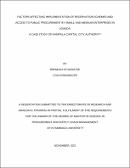Factors affecting implementation of reservation schemes and access to public procurement by small and medium enterprises in Uganda. a case study of kampala capital city authority
Abstract
The overall aim of the study was to assess the factors affecting the implementation of Reservation
Schemes in relation with access to public procurement contracts by prequalified SMEs in Kampala
Capital City Authority (KCCA), Uganda. The study was directed by these objectives: to examine
the effect of professionalism in public procurement management, execution of procurement
procedures, stakeholder training and access to information in relation with access to public
procurement contracts by SMEs in KCCA. A case study research design was borrowed. It mainly
engaged a quantitative approach including a qualitative approach. The population study comprised
of 140 accomplices including Accounting Officer, User Departments and Evaluation Committees,
Procurement and Disposal Unit Officers, Contracts Committee members and prequalified SMEs
from which 97 respondents sample size was determined using Krejice and Morgan statistical table
(1970). Simple and purposive sampling techniques were utilized in the study. The Quantitative
data analysis largely entailed the descriptive statistics (mean, percentages and standard deviation)
and inferential statistics (linear regression analysis and Pearson correlation coefficient). Content
analysis was used to analyze qualitative data. Findings revealed that there was a significant and
positive effect of professionalism in procurement management on access to public procurement
contracts by prequalified SMEs (β=0.391, P-value<0.05). Secondly, there was a significant and
positive effect of execution of procurement procedures on access to public procurement contracts
by prequalified SMEs (β=0.496, P-value<0.05) and this proved to be the strongest predictor among
the all the constructs included in the study. Thirdly, there was a significant and positive effect of
stakeholder training on access to public procurement contracts by prequalified SMEs (β=0.450, P value<
0.05). Lastly, findings indicated that access to information had a positive and significant
effect on access to public procurement contracts by prequalified SMEs (β=0.308, P-value<0.05).
It was concluded that effective professionalism in public procurement management, execution of
procurement procedures, Stakeholder training, and access to information are so important in
enhancing access to public procurement contracts by SMEs in KCCA. Thus, it is recommended
that there is a need for PDU officials at KCCA to demonstrate a high level of non-discrimination
by promoting transparency in what is being done in the process of contracting out services to
SMEs. Secondly, a primary decision needs to be always reached on what measures are applicable
for the kind of acquisition involved and its value. Thirdly, PDU staff are able to make full use of
the likelihood to accomplish framework agreements with a number of economic operators and to
organize simple competitions for entities to the framework agreement as actual procurement needs
arises. There is a need to ensure that payments are not postponed until the end of the year. This
will enable failure of SMEs to meet payment deadlines. More so, use of electronic payment
systems should be emphasized or promoted for easy payments. There is a need for PDU to ensure
that payments are suspended with a valid reason and need for an independent public procurement
training done for PDU staff at KCCA annually. Lastly, there is a need for Procurement and
Disposal Unit Officers at KCCA to be trained in reservation scheme handling.

